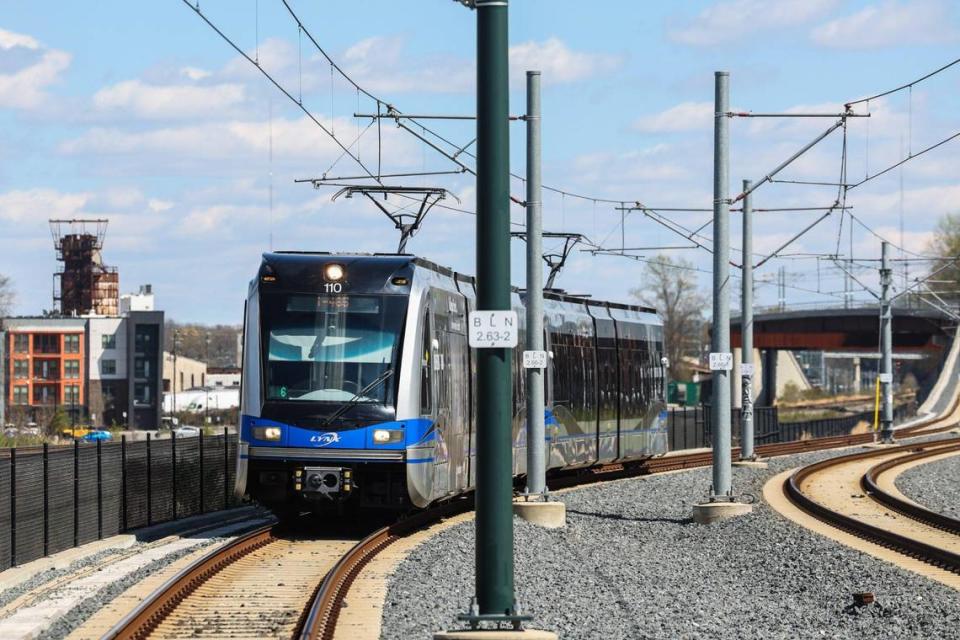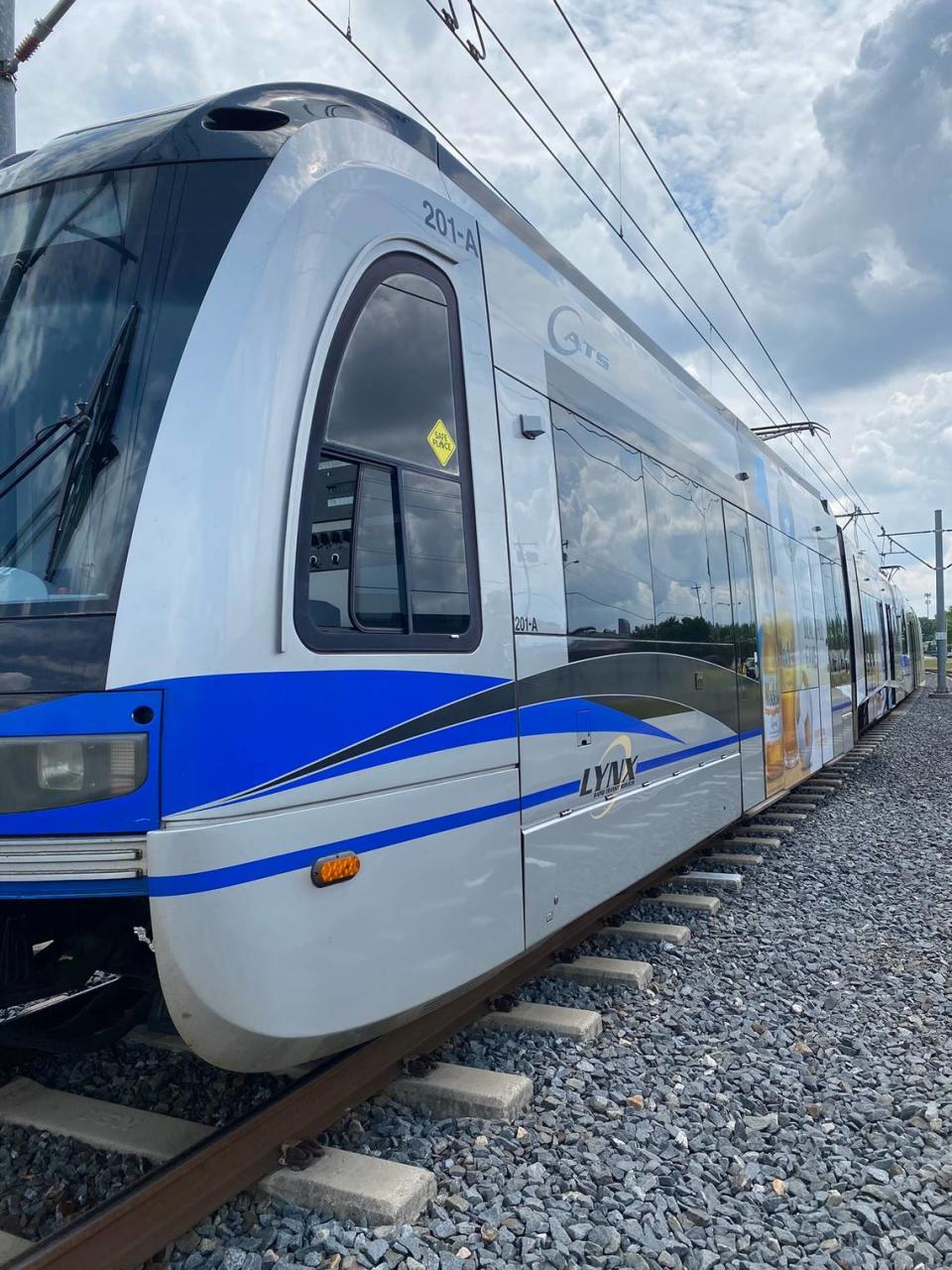CATS fired an employee for 2022 train derailment. He says there were warning signs
A Charlotte light rail controller says he was fired for how he handled the May 2022 Blue Line derailment despite being told the train was clear to run.
Light rail controller Terry Creech was fired on June 23 by the Charlotte Area Transit System after being suspended with pay following the derailment, according to a termination letter he provided to The Charlotte Observer. The letter says Creech committed two safety violations after the derailment.
“While it is confirmed that your actions did not contribute to the train’s derailment ... our records do confirm that the proper procedures were not followed,” the termination letter says.
The role of a light rail controller is similar to an air traffic controller. Creech controlled all train movement on CATS’ Blue and Gold lines, he said, and the May derailment happened on a weekend when upper management wasn’t working.
Creech says the train car shouldn’t have been put on the track in the first place. He found out later the light rail vehicle that derailed received maintenance for a wheel malfunction two days earlier. But Creech said he was told at the beginning of his May 21 shift that it was cleared to run with no more concerns.

“The only person who was terminated in all of this was me,” Creech said. “They needed someone to put it on.”
CATS interim CEO Brent Cagle revealed to the Charlotte City Council this month that a Blue Line train derailed in May 2022 due to a faulty axle bearing. To fix the issue, Cagle said CATS is working with rail company Siemens Mobility to expedite repairs on each train, which is expected to take several years.
CATS did not provide comment by Tuesday morning after The Charlotte Observer provided questions Friday. The Observer also hasn’t received a response to a public records request for personnel information allowed to be released under North Carolina’s public records law.
CATS: Creech did not perform inspection
The termination letter said Creech did not instruct the rail operator, the person driving the train, to do a “walkaround” inspection of the vehicle after being told the “train was unable to move, shaking badly, and unsafe to operate.”
Creech said the operator informed him he felt resistance from the train, but was able to move forward. So he instructed the operator to move to the next station to let passengers off so they could fully troubleshoot the issue. The train continued to have problems and the operator said they didn’t feel safe. That’s when Creech said he told the operator to stay put and sent a maintenance employee.
CATS Rail Operations and Facilities General Manager Deltrin Harris said in the termination letter telling the operator to move to the next station was a violation of troubleshooting policy.
“This judgment and instruction created an ‘unsafe environment’ for the riding public and CATS employees and caused more damage to the infrastructure, roadway and (light rail vehicle),” the letter says.
The second safety violation cited in Creech’s termination letter was an overrun red light. While Creech was responding to the derailment, a different rail operator asked to pass a red light and did so before receiving permission.

CATS blamed that on Creech’s inability to multitask when he should have ensured all trains nearby stopped during the derailment.
“Neither one of those incidents would’ve occurred if the train was functioning correctly,” Creech said. “If the train was not put back in service, none of this would have happened.”
The North Carolina Department of Transportation and local officials have both said delayed maintenance was the root cause of the May 21 derailment and the train should never have been cleared to run.
Creech said he was surprised by the media attention the derailment received and said “stuff like this doesn’t usually get out to the public” at CATS. Creech runs a youth writing and poetry nonprofit and has been serving as executive director full time since leaving CATS.
CATS said two other derailments occurred in 2022, but both were in the rail yard. The Observer asked if the Blue Line derailed prior to 2022 and is awaiting a response.
Creech’s timeline of events
Here’s the timeline of events on Saturday, May 21, according to information Creech wrote and provided to CATS.
▪ Creech clocked in at 11 a.m., relieving another controller from their 14-hour shift. That controller reported nothing out of the ordinary.
▪ At 11:12 a.m., a Blue Line rail operator traveling north called Creech, saying his train was “acting weird” and jerking a lot. Creech called maintenance and told an employee to meet the operator at Scaleybark station. He told the operator to continue to Scaleybark station.
▪ The operator called back, saying he didn’t think he would be able to make it to the station. Creech told him to “aux on and off” the train — resetting its internal computer.
▪ The problem continued, so Creech told the operator to put the train in neutral and gradually move it forward. The operator was unable to do this in a safe manner. Creech told the operator to stay still until maintenance arrived.
▪ When maintenance arrived, they realized the train had derailed.
▪ The only working supervisor was operating the Gold Line at the time, and the chief rail controller did not answer several phone calls, Creech said.
▪ Creech said he held trains in both directions while he reported the incident to the necessary parties and requested a bus to transport light rail passengers.
▪ At noon, the same rail controller Creech relieved earlier in the day returned to control the Gold Line. The chief rail controller arrived shortly after, and Creech informed her of the morning’s events.
▪ Two days later, Creech was told the derailed light rail vehicle had been pulled off the Blue Line on a different shift. Creech said he was not aware of this during his shift on May 21.
What happens next?
Repairing the problem that caused the derailment will cost the city of Charlotte $30 million. The city also needs to fund replacements for its aging bus fleet.
Wednesday night, members of the Metropolitan Transit Commission, a CATS policy board, voted to seek a third-party investigation into issues that include a May 2022 light rail derailment.
Commissioner @leighaltman requests CATS to proceed with drafting a request for proposals "to engage a third-party transit consultant to perform an operational investigation to establish facts related to the train derailment and other organization "failures" pic.twitter.com/jNK4SFhO8A
— genna (@GennaContino) March 24, 2023
Mecklenburg County Commissioner Leigh Altman made the motion and since has requested CATS to draft a request for proposals from consultants. Cagle said in an email to Altman that CATS is working on that for the MTC to review.
This story will be updated.

 Yahoo Autos
Yahoo Autos 